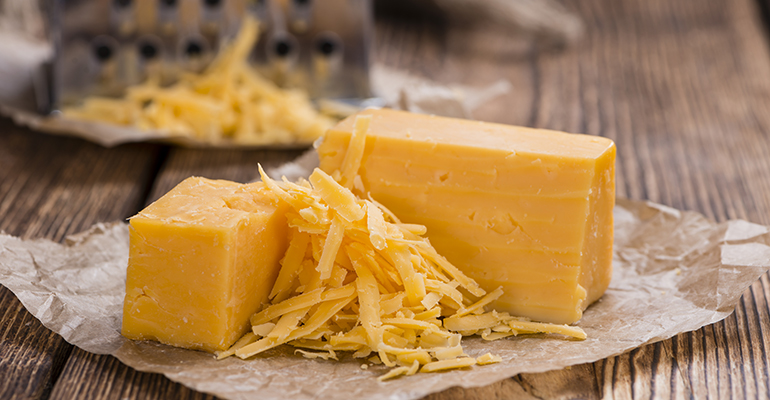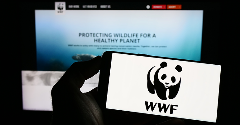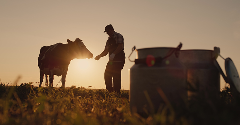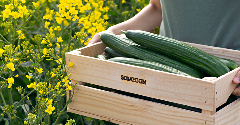News
Lidl Cheddar cheese shows rising popularity of carbon neutral food
31 May 2021Hard discounter Lidl will launch a carbon-neutral Cheddar cheese in UK stores before the end of the year. Are carbon neutral products the next big thing in sustainable food?
Chilled cheese is the second biggest carbon emitter in Lidl’s British supply chain, second only to fresh meat, said the German retailer.

Lidl hopes to achieve carbon neutrality for the Cheddar cheese product by helping its supplier, Wyke Farms, reduce on-farm emissions. This will be done by implementing best practice in five key areas covering feed management, soil and land management, manure management, herd management and energy management.
Specific actions that farmers could adopt include reducing fertiliser use, converting to deforestation-free feed or using low food-mile feed, Lidl said in a statement. However, it admitted that in order to reach the goal of carbon neutrality, it would also need to purchase carbon credits.
‘Future-proofing farming’
The supermarket’s pledge, which will be verified by independent third-party organization, The Carbon Trust, could result in savings of around 22.5 million kilos of CO2 a year.
Amali Bunter, head of responsible sourcing and ethical trade at Lidl GB said the aim of introducing more sustainable practices was to “future-proofing British farming”.
“Our partnership with Wyke Farms is aiming to tackle some of the barriers to addressing carbon-neutrality in farming. Developing a closed-loop system requires significant investment, but we believe that this pioneering programme will help set the standard for our supplier practices going forward,” she said.
Lidl and Wyke Farms are also working together on a bigger ambition to pioneer a closed-loop system by 2030, which will ensure that carbon neutrality is being achieved from completely within the supply chain itself. As part of this closed-loop system, the programme aims to incorporate carbon captured by Wyke farms through the process of turning bio-waste from local Lidl stores and suppliers into renewable energy, paving the way for a fully sustainable dairy farming model.
Carbon-neutral has growing traction
Over one-third of global greenhouse gas emissions caused by human activity can be attributed to the way we produce, process and package food, according to a recently-published study funded by the United Nations (UN).
Demand for plant-based food and drink, seen as inherently more sustainable and environmentally friendly, has exploded in recent years. But there is also growing interest in products that show their sustainable credentials in other ways, such as carbon neutrality or life cycle assessments.
A 2020 survey commissioned by the Carbon Trust found that two-thirds of the 10,000 consumers polled supported carbon labelling on products while 64% said they were more likely to think positively about a brand that could demonstrate it had lowered the carbon footprint of its products.
Plant-based, non-profit organization ProVeg International collaborated with Lidl to develop its German Next Level range, surveying thousands of consumers to understand what they were looking for in products. Lidl applied these findings to the range, which comes in fully recyclable packaging with reduced plastic content. Products in the range also provide on-pack information on its carbon footprint.
“Private label ranges are changing from niche to mass, said Verena Wiederkehr, international head of food industry and retail at ProVeg International, in an Fi CONNECT webinar last year. “Before they were tailored towards vegans and vegetarians, [and] the packaging design and the message conveyed reflected this. Today, we can truly see that private labels are targeting flexitarians, such as Lidl’s Next Level, which is more inclusive.”
Wiederkehr noted that Austrian hard discounter Hofer provides an on-pack life cycle assessment for products in its Back to Origins range while Rewe-owned German discounter Penny now displays ‘the true cost of food’ alongside the actual retail price on 16 of its private label products sold in one of its stores in Berlin.
Penny asked researchers at the University of Augsburg to calculate the true cost of the products when taking into account externalities such as carbon and nitrogen emissions, energy consumption and the impact of over-fertilisation.
The researchers estimated that gouda cheese, for instance, should be 88% more expensive than the current market price. By informing consumers of this discrepancy, Penny said it hoped to highlight the true cost of current consumption habits.
Related news

Soy story: WWF scores UK supermarkets on sustainability efforts
12 Nov 2025
WWF has published its latest “Soy Scorecard”, ranking UK supermarkets’ efforts to combat deforestation and land conversion in their soy supply chains.
Read more
Standing Ovation and Bel scale up casein production from dairy co-products
11 Nov 2025
Foodtech company Standing Ovation has partnered with cheese specialist Bel Group to manufacture dairy serums for industrial-scale casein production via precision fermentation.
Read more
New UPF standard hoped to offer consumers ‘coherence and clarity’
10 Nov 2025
Ingredients companies are being urged to enter “a new era of partnership and innovation” following the launch of the industry’s first non-UPF verification scheme.
Read more
Whistleblowers accuse UK meat industry of promoting cheap, unsustainable supply
7 Nov 2025
An anonymous group of industry insiders has accused the UK’s biggest food companies of systematically driving down meat quality and welfare standards.
Read more
Bord Bia presents Irish dairy ingredient suppliers at Fi Europe
6 Nov 2025
Dairygold Co-operative Society, The Carbery Group, and Ornua Co-operative: Meet with sustainable producers of Irish dairy ingredients at Food ingredients Europe 2025, Hall 7.2 Stand M18.
Read more
AI attraction means foodtech startups must ‘prove’ rather than ‘promise’
4 Nov 2025
Reports suggest that artificial intelligence (AI) is sucking investment from foodtech and agritech, but investors say the picture is complicated.
Read more
Penguin and Club bars no longer classed as chocolate
30 Oct 2025
Penguin and Club bars can no longer be classified as chocolate after the pladis-owned McVitie’s brands turned to cheaper alternatives amid the ongoing cocoa crisis.
Read more
Could plant-based protection replace plastic packaging?
29 Oct 2025
Swedish foodtech company Saveggy has launched an additive-free plant-based protection for cucumbers, offering a waste-free packaging solution for fruit and vegetables.
Read more
Does promoting protein content push up plant-based sales?
27 Oct 2025
Promoting the protein content of meat-free products is a more effective sales strategy than adding carbon labels, a study of UK bakery chain Greggs suggests.
Read more
Amazon Grocery launch aims to balance quality with affordability
22 Oct 2025
Global e-commerce giant Amazon has introduced a new private-label food brand, combining existing Amazon Fresh and Happy Belly products with new everyday items.
Read more